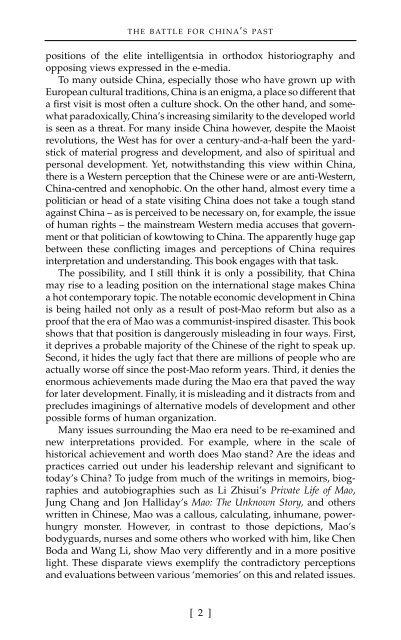Battle for China's Past : Mao and the Cultural Revolution
Battle for China's Past : Mao and the Cultural Revolution
Battle for China's Past : Mao and the Cultural Revolution
You also want an ePaper? Increase the reach of your titles
YUMPU automatically turns print PDFs into web optimized ePapers that Google loves.
THE BATTLE FOR CHINA’ S PAST<br />
positions of <strong>the</strong> elite intelligentsia in orthodox historiography <strong>and</strong><br />
opposing views expressed in <strong>the</strong> e-media.<br />
To many outside China, especially those who have grown up with<br />
European cultural traditions, China is an enigma, a place so different that<br />
a first visit is most often a culture shock. On <strong>the</strong> o<strong>the</strong>r h<strong>and</strong>, <strong>and</strong> somewhat<br />
paradoxically, China’s increasing similarity to <strong>the</strong> developed world<br />
is seen as a threat. For many inside China however, despite <strong>the</strong> <strong>Mao</strong>ist<br />
revolutions, <strong>the</strong> West has <strong>for</strong> over a century-<strong>and</strong>-a-half been <strong>the</strong> yardstick<br />
of material progress <strong>and</strong> development, <strong>and</strong> also of spiritual <strong>and</strong><br />
personal development. Yet, notwithst<strong>and</strong>ing this view within China,<br />
<strong>the</strong>re is a Western perception that <strong>the</strong> Chinese were or are anti-Western,<br />
China-centred <strong>and</strong> xenophobic. On <strong>the</strong> o<strong>the</strong>r h<strong>and</strong>, almost every time a<br />
politician or head of a state visiting China does not take a tough st<strong>and</strong><br />
against China – as is perceived to be necessary on, <strong>for</strong> example, <strong>the</strong> issue<br />
of human rights – <strong>the</strong> mainstream Western media accuses that government<br />
or that politician of kowtowing to China. The apparently huge gap<br />
between <strong>the</strong>se conflicting images <strong>and</strong> perceptions of China requires<br />
interpretation <strong>and</strong> underst<strong>and</strong>ing. This book engages with that task.<br />
The possibility, <strong>and</strong> I still think it is only a possibility, that China<br />
may rise to a leading position on <strong>the</strong> international stage makes China<br />
a hot contemporary topic. The notable economic development in China<br />
is being hailed not only as a result of post-<strong>Mao</strong> re<strong>for</strong>m but also as a<br />
proof that <strong>the</strong> era of <strong>Mao</strong> was a communist-inspired disaster. This book<br />
shows that that position is dangerously misleading in four ways. First,<br />
it deprives a probable majority of <strong>the</strong> Chinese of <strong>the</strong> right to speak up.<br />
Second, it hides <strong>the</strong> ugly fact that <strong>the</strong>re are millions of people who are<br />
actually worse off since <strong>the</strong> post-<strong>Mao</strong> re<strong>for</strong>m years. Third, it denies <strong>the</strong><br />
enormous achievements made during <strong>the</strong> <strong>Mao</strong> era that paved <strong>the</strong> way<br />
<strong>for</strong> later development. Finally, it is misleading <strong>and</strong> it distracts from <strong>and</strong><br />
precludes imaginings of alternative models of development <strong>and</strong> o<strong>the</strong>r<br />
possible <strong>for</strong>ms of human organization.<br />
Many issues surrounding <strong>the</strong> <strong>Mao</strong> era need to be re-examined <strong>and</strong><br />
new interpretations provided. For example, where in <strong>the</strong> scale of<br />
historical achievement <strong>and</strong> worth does <strong>Mao</strong> st<strong>and</strong>? Are <strong>the</strong> ideas <strong>and</strong><br />
practices carried out under his leadership relevant <strong>and</strong> significant to<br />
today’s China? To judge from much of <strong>the</strong> writings in memoirs, biographies<br />
<strong>and</strong> autobiographies such as Li Zhisui’s Private Life of <strong>Mao</strong>,<br />
Jung Chang <strong>and</strong> Jon Halliday’s <strong>Mao</strong>: The Unknown Story, <strong>and</strong> o<strong>the</strong>rs<br />
written in Chinese, <strong>Mao</strong> was a callous, calculating, inhumane, powerhungry<br />
monster. However, in contrast to those depictions, <strong>Mao</strong>’s<br />
bodyguards, nurses <strong>and</strong> some o<strong>the</strong>rs who worked with him, like Chen<br />
Boda <strong>and</strong> Wang Li, show <strong>Mao</strong> very differently <strong>and</strong> in a more positive<br />
light. These disparate views exemplify <strong>the</strong> contradictory perceptions<br />
<strong>and</strong> evaluations between various ‘memories’ on this <strong>and</strong> related issues.<br />
[ 2 ]
















